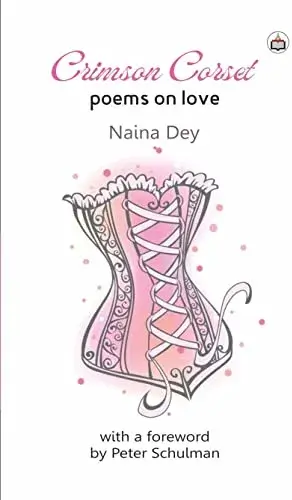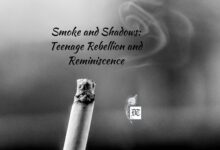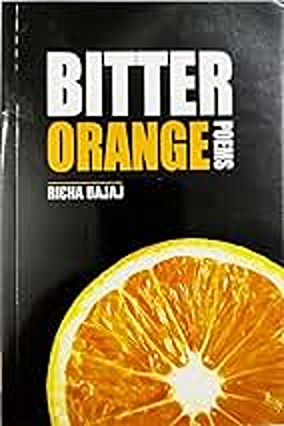Naina Dey’s “Crimson Corset” explores contemporary love complexities, showcasing sensual and thought-provoking poetry. A review by Sutanuka, exclusively for Different Truths

Crimson Corset: Poems on Love is Naina Dey’s third book of poetry. It has a neat structure, thematically divided into four sections: Crimson Corset, Daily Life, From Snapshots from Space, and Other Poems (2014), and Homing Pigeons and Sundry Stuff (2020). In the foreword of the book, Peter Schulman writes, “In her beautiful and sensual collection, Crimson Corset, love is indeed defined by a plethora of images of dissolving time, erupted memory, perfumes, gazes, music, and metaphors”.
The opening poem, “My Heart is a Lyre,” reminds one of the Bengali Rupkatha (fairytale) Thakumar Jhuli, where the Princess waits for her Prince to awaken her from her stony slumber. Dey writes,
My lyre has lain expectant For ages And for ages will it lie For the chosen one
The titular poem, “Crimson Corset,” almost chokes us with emotions …
The titular poem, “Crimson Corset,” almost chokes us with emotions, “as her mellifluous title alliteratively alludes to “Crimson Corset”.
A single look took in a shape Painted lips Silk hair Gazelle eyes Quickly turning around I beheld myself in the long mirror
Dey’s unique style creates a new trend in love poems—where there is a heady concoction of desire, longing, loss, and memory, and she slogs “from dawn to dusk” and finds “time for love’s deception”. With languishing ease, she writes in “Call My Name”,
Call my name in the dead of night The night will respond
The night will respond, as it is perhaps the best time for the awakening of the senses. These short, crisp love poems are as sensuous as the night itself. One plays with the body in love. The ‘flesh’ becomes the axis, and touching is the key to unlocking the heart. In Dey’s poetry, ‘words’ en route become the substitute for the flesh or touch.
ngers barely touch the thin skin of your words that you want me to take into my mouth to drench my insides with the sweetness of fire because you want me to flower again.
In “Eraka,” her ‘body is a text, even though numerous attempts were made to skewer and shred it down the ages…
In “Eraka,” her ‘body is a text, and even though numerous attempts were made to skewer and shred it down the ages, she will still “sprout like eraka grass” and laugh at the foolish striving to uproot her. The mythical tale of the destruction of the violent and hedonistic Yadava clan in the Mahabharata has been reframed and retold. The body’s breakneck atrophy is just the poet showing her claim to multiply in numbers.

“Let me write a poem” has the oral power of the imagination when it seeps through our consciousness and leaves us in a vibrating silence solely to ourselves. Dey writes,
Let me write a poem tonight Let me be all alone wrapped in silence as I unwrap my heart …Let me be alone So, I can turn into a poem
Silence speaks more than hollow words and perhaps that is why the poet shuns words without conviction
or I cannot tell you What I really want to tell you My fear of age, loneliness, and death
Memory is a trope in Dey’s poems, and memory rekindles chiasmic longing and loss in poems like “Old Flames” and “Kath Champa”. What sets these poems apart is the vivid imagery sprinkled with a giddy desire to hold on to the” moment of purity” and then let go of “love’s deception”.
With you day is day and night is night and everything in between poised, expectant for a moment of purity transparent as a drop of dew suspended at the edge of being
The twenty-first-century lady is no coyer. She is bold and unabashedly hers.
We have passed the time of Spencer and Shakespeare. The twenty-first-century lady is no coyer. She is bold and unabashedly hers. She loves to call her own shots.
Love and devotion are nothing At least for us women Love one, covet another Revere one, fuck another And we play along With our bodies and our minds Arms and armours are for goddesses For us silence is peace “Survival of the fittest” Mr Spencer would have said
Dey captures geographical spaces along with mythical and metaphorical spaces, demonstrating her total command over the contemporary poetic idiom. One feels tempted to marvel at Dey’s clairvoyance in poems like “Love During COVID-19—the world was grappling with the deadly virus that confined us at home.
ove is for TV. And fake apocalypses
The poet’s clairvoyance has perhaps emerged from the intense quiet of the pandemic to delve deep into the core of poetry. Once done with the crisis, Dey begins with fresh energy and a questioning intellect and boldly strides away from the standard trope of exploring conventional love in “Acid Love,” which she dedicates to the victims of acid attacks.
“Crimson Corset” is a collection that will make one wear the thinking hat and add to the expansion of the mental horizon.
Cover image sourced by the reviewer





 By
By
 By
By
 By
By
 By
By